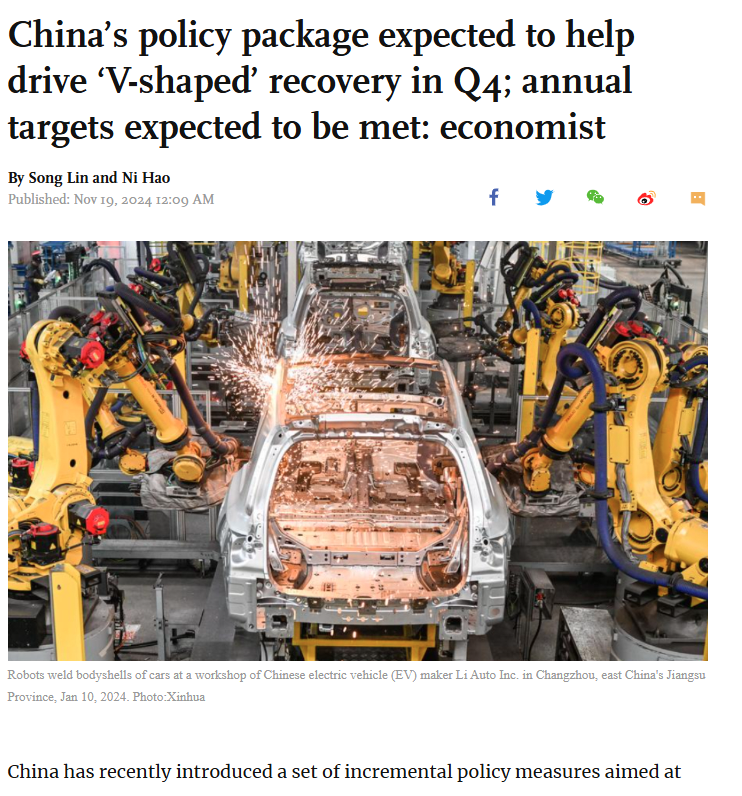LATEST INSIGHTS
Your Present Location: LATEST INSIGHTSDong Shaopeng: China’s policy package expected to help drive ‘V-shaped’ recovery in Q4; annual targets expected to be met: economist
Source: Global Times Published: 2024-11-19

By Song Lin and Ni Hao
China has recently introduced a set of incremental policy measures aimed at stabilizing growth, expanding domestic demand, and mitigating risks. These policies are not only focused on addressing current challenges but also on tackling major issues affecting the country’s long-term economic development, economists stated at a forum hosted by the China Public Diplomacy Association in Beijing on Monday.
The package of incremental policies has a primary goal of achieving high-quality development. It outlines a comprehensive and systematic approach to addressing the new challenges and issues emerging across different sectors of the economy, said Wu Sa, deputy director of the Economic Research Institute at the Academy of Macroeconomic Research under the National Development and Reform Commission, said at the forum.
Specifically, these policies focus on five key areas, Wu said at the forum: first, enhancing macroeconomic counter-cyclical measures; second, expanding domestic demand; third, increasing support for businesses; fourth, stabilizing the real estate market; and fifth, revitalizing the capital markets.
The five key areas of this policy package are strategically designed to address macroeconomic regulation, define the primary focus of economic work, create a favorable development environment, eliminate potential risks, and effectively boost expectations across various sectors. Each aspect is carefully planned with a clear, targeted direction, Wu noted.
Since October, the national economy has seen steady progress and recovery. Major economic indicators for consumption, services and trade improved significantly, and employment and prices were basically stable. Social expectations also continued to improve, and there was progress in high-quality development, Ding Yifan, a senior fellow of the Institute of World Development under the State Council's Development Research Center, said at the forum.
Data from the National Bureau of Statistics (NBS) showed on Friday that fixed-asset investment increased 3.4 percent year-on-year in the first 10 months to 42.32 trillion yuan ($5.88 trillion).
“The country's investment growth has remained generally stable, and the investment structure continues to improve,” NBS spokesperson Fu Linghui said at a press conference.
Dong Shaopeng, a senior research fellow at the Chongyang Institute for Financial Studies at Renmin University of China, said at the forum that the package of incremental policies, including fiscal, monetary, and industrial policies, has helped address many bottlenecks in economic development.
There is much attention on whether the Chinese government will increase fiscal spending next year. Such policy reserves are available, but the decision will depend on the social and economic conditions at the time, Dong said.
Nearly half of the package of incremental policies has already been implemented, and more measures are set to be introduced and implemented, Wu said, adding that with the continued impact of both existing and incremental policies, development vitality and momentum are steadily being unleashed.
The policy package is expected to help drive a “V-shaped” recovery in the fourth quarter, with the annual targets expected to be met, he noted.
Calling it “an unprecedented round of macroeconomic regulation,” Wu said that the package of incremental policies is comprehensive, complex, and involves significant investment. It is designed not only to address immediate challenges but also to tackle key long-term issues in economic development.
Key Words: Dong Shaopeng, RDCY, China, Economy, policy























































































 京公网安备 11010802037854号
京公网安备 11010802037854号





